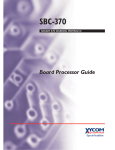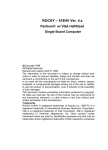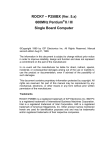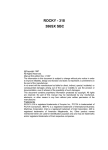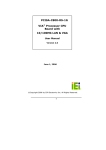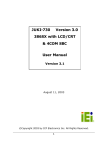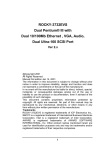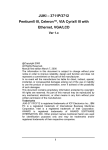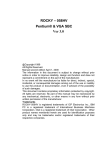Download ROCKY – 538TXV - Vox Technologies
Transcript
ROCKY – 538TXV Pentium™VGA Single Board Computer @Copyright 1997 All Rights Reserved. Manual third edition Feb.01,1998 The information in this document is subject to change without prior notice in order to improve reliability, design and function and does not represent a commitment on the part of the manufacturer. In no event will the manufacturer be liable for direct, indirect, special, incidental, or consequential damages arising out of the use or inability to use the product or documentation, even if advised of the possibility of such damages. This document contains proprietary information protected by copyright. All rights are reserved. No part of this manual may be reproduced by any mechanical, electronic, or other means in any form without prior written permission of the manufacturer. Trademarks ROCKY-538TXV is registered trademarks of Acquire Inc.,IBM PC is a registered trademark of International Business Machines Corporation. Intel is a registered trademark of Intel Corporation. AMI is registered trademarks of American Megatrends, Inc. Other product names mentioned herein are used for identification purposes only and may be trademarks and/or registered trademarks of their respective companies. Contents 1. Introduction .......................................................... 3 1.1 Specifications .............................................................................. 4 1.2 What You Have ........................................................................... 5 2. Installation ............................................................ 6 2.1 ROCKY-538TXV's Layout ............................................................ 6 2.2 Unpacking ................................................................................... 8 2.3 Setting the CPU of ROCKY-538TXV ........................................... 9 2.4 System Memory DRAM.............................................................. 11 2.5 Watch-Dog Timer ...................................................................... 12 2.6 DiskOnChip™Flash Disk ............................................................ 12 2.7 Clear CMOS Setup .................................................................... 14 2.8 Battery Backup for CMOS Setup ............................................... 14 3. Connection ......................................................... 15 3.1 Floppy Disk Drive Connector...................................................... 15 3.2 PCI E-IDE Disk Drive Connector ................................................ 16 3.3 Parallel Port............................................................................... 17 3.4 Serial Ports................................................................................ 17 3.5 Keyboard Connector .................................................................. 18 1 3.6 External Switches and Indicators ............................................... 18 3.7 External Speaker ....................................................................... 19 3.8 PS/2 Mouse 6-Pin Mini-DIN Connector ...................................... 19 3.9 External Battery Connector ....................................................... 20 3.10 USB Port Connector .................................................................. 20 3.11 IrDA Infrared Interface Port ....................................................... 20 3.12 VGA Connector ......................................................................... 21 3.13 Fan Connector .......................................................................... 21 3.14 Chassis Open Alarm Connector ................................................ 22 3.15 +5V Standby Connector for ATX Power Supply ......................... 22 3.16 ATX Power Switch / Soft Power Switch Connector ..................... 23 4. AWARD BIOS Setup ......................................... 24 4.1 Getting Start .............................................................................. 24 4.2 Standard CMOS Setup .............................................................. 25 4.3 BIOS Features Setup ................................................................. 27 4.4 Chipset Features Setup.............................................................. 28 4.5 Integrated Peripherals ............................................................... 29 4.6 Power Management Setup ......................................................... 30 4.7 PNP/PCI Configuration .............................................................. 31 2 5. E Key Function .................................................. 32 Appendix A. Watch-Dog Timer .............................. 34 2 1 Introduction Welcome to the ROCKY-538TXV Pentium™with VGA Single Board Computer. The ROCKY-538TXV board is an ISA/PCI form factor board, which comes equipped with high performance Pentium CPU and advanced high performance multi-mode I/O, designed for the system manufacturers, integrators, or VARs that want to provide all the performance, reliability, and quality at a reasonable price. This board built-in DiskOnChip™ (DOC) Flash Disk for embedded application. The DOC Flash Disk is 100% compatible to hard disk. User can use any DOS command without any extra software utility. The DOC currently is available from 2MB to 72MB. There also have PROMDISK-Chip™can be used in the same DOC socket as an alternative solution. An advanced high performance super AT I/O chip – Winbond W83977TF is used in the ROCKY-538TXV board. Both on-chip UARTs are compatible with the NS16C550. The parallel port and IDE interface are compatible with IBM PC/AT and XT architecture's. In addition, the ROCKY-538TXV provides four 72-pin SIMM sockets and one 168-pin DIMM socket for its on-board DRAM. The RAM module accepts 1MB, 2MB, 4MB, 8MB, 16MB, 32MB, And 64MB. So,the total on-board memory can be configured from 2MB to 256MB. ROCKY-538TXV uses the advanced INTEL Chipset,430TX which is 100% ISA/PCI compatible chipset.with PCI 2.1 standard. 3 1.1 Specifications : The ROCKY-538TXV Pentium with VGA Single Board Computer provides the following specification: • CPU : Pentium™ /MMX up to 233Mhz, AMD K5/K6 processor, Cyrix 6x86 processor • Bus : ISA bus and PCI 32-bit local bus,PCI 2.1 standard • DMA channels : 7 • Interrupt levels : 15 • Chipset : Intel 430TX • PCI VGA : with 2MB RAM Resolution : 1280x1024,256 color,75Hz 1024x768, 64K color,75Hz 800x600,full color,90Hz • Real-time clock/calendar : in 430TX chipset,backup by industrial Li-battery,3V/850mAH. . • RAM memory : 2MB to 256MB,SDRAM,EDO and standard DRAM supported • Second Cache memory : 512KB Pipelined Burst SRAM on board • Ultra DMA/33 IDE Interface : up to four PCI Enhance IDE hard drives. The Ultra DMA/33 IDE can handle data transfer up to 33MB/s. The best of all is that is new technology is compatible with existing ATA-2 IDE specifications. So there is no need to do any change for customer’ s current accessory. • Floppy disk drive interface : two 2.88 MB, 1.44MB, 1.2MB, 720KB, or 360KB floppy disk drives. • Two high speed Series ports : NS16C550 compatible UARTs • Bi-directional Parallel Port 4 • IrDA port : Support Serial Infrared(SIR) and Amplitude Shift Keyed IR(ASKIR) interface. • USB port : Support two USB ports for future expansion. • Watch-dog timer : can be set by 1,2,10,20,110 or 220 seconds period. Reset or NMI was generated when CPU did not periodically trigger the timer. Your program use hex 043 and 443 to control the watch-dog and generate a system reset. • Flash Disk - DiskOnChip™ :or PROMDISK-Chip™: The Flash Disk provide 100% compatible with hard disk. The built-in TrueFFS Transparent Flash Block Management and Space Reclamation will let customer to use the Flash Disk with DOS command, no need any extra software utility. • Keyboard connector • Mouse : PS/2 Mouse Port on-board. • Power Consumption : +5V @ 4.6A ( Pentium/MMX-200,16MB EDO RAM) +12V @ 70mA , -12V@20mA • Operating Temperature : 0° ~ 55° C ( CPU needs Cooler) 1.2 What You Have In addition to this User's Manual, the ROCKY-538TXV package includes the following items: • ROCKY-538TXV Pentium with Single Board Computer • RS-232/Printer Cable • FDD/HDD Cable • 6-pin Mini-Din to 5-pin Din Keyboard Adapter Cable If any of these items is missing or damaged, contact the dealer from whom you purchased the product. Save the shipping materials and carton in case you want to ship or store the product in the future. 5 2 Installation This chapter describes how to install the ROCKY-538TXV. At first, the layout of ROCKY-538TXV is shown, and the unpacking information that you should be careful is described. The jumpers and switches setting for the ROCKY-538TXV's configuration, such as CPU type selection, system clock setting, and watch dog timer, are also included. 2.1 ROCKY-538TXV's Layout < reference next page > 6 2.2 Unpacking 7 Your ROCKY-538TXV Single Board Computer contains sensitive electronic components that can be easily damaged by static electricity. In this section, we describe the precautions you should take while unpacking, as well as during installation. It is very important that the instructions be followed correctly, to avoid static damage, and to successfully install the board. The system board should be done on a grounded anti-static mat. The operator should be wearing an anti-static wristband, grounded at the same point as the anti-static mat. Inspect the cardboard carton for obvious damage. Shipping and handling may cause damage to your board. Be sure there are no shipping and handing damages on the board before processing. After opening the cardboard carton, exact the system board and place it only on a grounded anti-static surface component side up. Again inspect the board for damage. Press down on all the socketed IC's to make sure that they are properly seated. Do this only with the board place on a firm flat surface. Note : DO NOT APPLY POWER TO THE BOARD IF IT HAS BEEN DAMAGED. You are now ready to install your ROCKY-538TXV Single Board Computer. 8 2.3 Setting the CPU of ROCKY-538TXV • CPU Clock Setting : CPU Speed/Clock 55MHz 60MHz 66MHz JP 9 1-2 OPEN OPEN OPEN JP9 3-4 CLOSE CLOSE OPEN JP9 JP9 11-12 13-14 CLOSE OPEN OPEN OPEN OPEN OPEN JP9 7-8 OPEN OPEN CLOSE CLOSE OPEN JP9 9-10 OPEN OPEN OPEN OPEN OPEN • CPU to Bus Multiple : Multiplier 1.5 x 2x 2.5x 3x 3.5 x JP 9 5-6 OPEN CLOSE CLOSE OPEN OPEN CPU Frequency = CPU Clock x Multiplier for example Pentium 200MHz = 66MHz CPU Clock x 3 • CPU Core Voltage Selection : Please check the CPU Core Voltage before you install the CPU. Right now new Intel MMX CPU is dual voltages for core and I/O,the I/O is 3.3V but the core is 2.8V. This kind of CPU design will enhance the low power consumption capability. As for the general Pentium CPU is one voltage for I/O and Core - 3.3V,3.4V,or 3.5V 9 • JP16 CPU Core Voltage Setting : CPU Core Voltage 3.5V(P54C/CS) VRE 3.4V(P54C/CS) STD 3.3V 3.2V 3.1V 3.0V 2.9V 2.8V 2.7V 2.6V 2.5V 2.4V 2.3V 2.2V 2.1V 2.0V JP16 1-2 CLOSE JP16 3-4 CLOSE JP16 5-6 CLOSE JP16 7-8 CLOSE OPEN CLOSE CLOSE CLOSE CLOSE OPEN CLOSE OPEN CLOSE OPEN CLOSE OPEN CLOSE OPEN CLOSE OPEN CLOSE OPEN OPEN OPEN CLOSE CLOSE OPEN OPEN CLOSE CLOSE OPEN OPEN CLOSE CLOSE OPEN OPEN CLOSE CLOSE OPEN OPEN OPEN OPEN CLOSE CLOSE CLOSE CLOSE OPEN OPEN OPEN OPEN CLOSE CLOSE CLOSE CLOSE CLOSE CLOSE OPEN OPEN OPEN OPEN OPEN OPEN OPEN OPEN • Dual / Single CPU Voltage setting : Vcore & VIO Pentium (P54C) Pentium MMX AMD K6 Cyrix 6x86MX Dual Voltage JP11 CLOSE JP12 CLOSE JP13 OPEN JP14 OPEN OPEN OPEN CLOSE CLOSE 10 • Cyrix 6x86MX PR Rating Table ( Vcore : 2.9V,dual voltage ) PR Rating Bus MHz CPU Core MHz 6x86MX-PR133 50 100 6x86MX-PR133* 55 110 6x86MX-PR150 60 120 6x86MX-PR150 50 125 6x86MX-PR166 66 133 6x86MX-PR166 55 138 6x86MX-PR166 50 150 6x86MX-PR166 60 150 6x86MX-PR200 55 165 6x86MX-PR200 66 166 6x86MX-PR200 60 180 6x86MX-PR233 66 200 6x86MX-PR266 66 233 Clock Multiplier 2x 2x 2x 2.5x 2x 2.5x 3x 2.5x 3x 2.5x 3x 3x 3.5x • AMD K6 MMX Rating Table, dual voltage Product Name AMD-K6-233 AMD-K6-200 AMD-K6-166 Core Freq 233MHz 200MHz 166MHz Vcore Bus MHz 3.2V 66 2.9V 66 2.9V 66 Multiplier 3.5x 3x 2.5x 2.4 System Memory DRAM There are four 72-pin SIMM sockets to accept Paged/EDO 1MB,2MB,4MB,8MB,16MB,32MB,or 64MB memory modules. The total capacity is from 2MB to 256MB.Customers have to install at least 2pcs RAM module on board,SIMM Socket 1,2 or 3,4. From right side to left side,the SIMM sockets are SIMM 1,SIMM 2,SIMM 3,SIMM 4. There also have a 168-pin DIMM socket for SDRAM. When install the 168-pin DIMM,then will not allow to install 72-pin SIMM1 and SIMM2. 11 2.5 Watch-Dog Timer The Watch-Dog Timer is enabled by reading port 443H. It should be triggered before the time-out period ends, otherwise it will assume the program operation is abnormal and will issue a reset signal to start again, or activate NMI to CPU. The Watch-Dog Timer is disable by reading port 043H. • JP6 : Watch-Dog Active Type Setting JP6 DESCRIPTION 2-3 RESET WHEN WDT TIME-OUT ACTIVATE NMI TO CPU WHEN WDT TIME-OUT 1-2 DISABLE WDT OPEN • JP7: WDT Time-Out Period PERIOD 1-2 3-4 OPEN OPEN 1 sec. OPEN OPEN 2 sec. 10 sec. OPEN CLOSE OPEN CLOSE 20 sec. 110 sec. CLOSE OPEN 220 sec. CLOSE OPEN 5-6 CLOSE CLOSE OPEN OPEN OPEN OPEN 7-8 OPEN CLOSE OPEN CLOSE OPEN CLOSE 2.6 DiskOnChip™Flash Disk The DiskOnChip™Flash Disk Chip(DOC) is produced by MSystems. Because the DOC is 100% compatible to hard disk and DOS.Customer don‘ t need any extra software utility. It is just “ plug and play” ,easy and reliable. Right now the DOC is available from 2MB to 72MB.There also have PROMDISK-Chip™can be used with the same socket. There have two sockets for the DOC. Based on the two sockets,customer could have two Flash Disk Drives. And in the future the DOC and PROMDISK-Chip will upgrade firmware to allow two flash disk chips combined to one drive. At that time the total capacity will be up to 144MB. The DiskOnChip will share only 8KB memory address for each one 12 socket. • JP15 : DiskOnChip Memory Address Setting 1. JP15 Pin 1-2 Close – main address C8000H Flash Chip Address U18 C8000H , Pin 7-8 close CC000H, Pin 9-10 close U18 U15 CA000H, Pin 11-12 close CE000H, Pin 13-14 close U15 2. JP15 Pin 3-4 Close – main address D0000H Flash Chip Address D0000H , Pin 7-8 close U18 D4000H, Pin 9-10 close U18 D2000H, Pin 11-12 close U15 D6000H, Pin 13-14 close U15 3. JP15 Pin 5-6 Close – main address D8000H Flash Chip Address D8000H , Pin 7-8 close U18 DC000H, Pin 9-10 close U18 DA000H, Pin 11-12 close U15 DE000H, Pin 13-14 close U15 13 2.7 Clear CMOS Setup If want to clear the CMOS Setup(for example forgot the password you should clear the setup and then set the password again.),you should close the JP17 pin 2-3 about 3 seconds,then open again. Set back to normal operation mode,close pin 1-2. • JP17 : Clear CMOS Setup (Reserve Function) JP17 1-2 3-4 DESCRIPTION Normal Operation Clear CMOS Setup 2.8 Battery Backup for CMOS Setup There have one 4-pin header J9 using for battery backup function. When close the pin 1-2 will use the on board battery. When use external battery you should take off the jumper and use the connector as external battery connector. • J9 : Battery Backup Function J9 1-2 CLOSE 3-4 OPEN 1-2 OPEN 3-4 OPEN DESCRIPTION Using Internal Battery Use as External Battery Connector 14 3 Connection This chapter describes how to connect peripherals, switches and indicators to the ROCKY-538TXV board. 3.1 Floppy Disk Drive Connector ROCKY-538TXV board equipped with a 34-pin daisy-chain driver connector cable. • J2 : FDC CONNECTOR PIN NO. 1 3 5 7 9 11 13 15 17 19 21 23 25 27 29 31 33 DESCRIPTION GROUND GROUND GROUND GROUND GROUND GROUND GROUND GROUND GROUND GROUND GROUND GROUND GROUND GROUND GROUND GROUND GROUND PIN NO. 2 4 6 8 10 12 14 16 18 20 22 24 26 28 30 32 34 15 DESCRIPTION REDUCE WRITE N/C N/C INDEX# MOTOR ENABLE A# DRIVE SELECT B# DRIVE SELECT A# MOTOR ENABLE B# DIRECTION# STEP# WRITE DATA# WRITE GATE# TRACK 0# WRITE PROTECT# READ DATA# SIDE 1 SELECT# DISK CHANGE# 3.2 PCI E-IDE Disk Drive Connector You can attach four IDE( Integrated Device Electronics) hard disk drives to the ROCKY-538TXV IDE controller. J1(IDE 1) : Primary IDE Connector J5(IDE 2) : Secondary IDE Connector • J1/J5: IDE Interface Connector PIN NO. 1 3 5 7 9 11 13 15 17 19 21 23 25 27 29 31 33 35 37 39 DESCRIPTION RESET# DATA 7 DATA 6 DATA 5 DATA 4 DATA 3 DATA 2 DATA 1 DATA 0 GROUND N/C IOW# IOR# N/C N/C INTERRUPT SA1 SA0 HDC CS0# HDD ACTIVE# PIN NO. 2 4 6 8 10 12 14 16 18 20 22 24 26 28 30 32 34 36 38 40 16 DESCRIPTION GROUND DATA 8 DATA 9 DATA 10 DATA 11 DATA 12 DATA 13 DATA 14 DATA 15 N/C GROUND GROUND GROUND BALE - DEFAULT GROUND - DEFAULT IOCS16#-DEFAULT N/C SA2 HDC CS1# GROUND 3.3 Parallel Port This port is usually connected to a printer, The ROCKY-538TXV includes an on-board parallel port, accessed through a 26-pin flat-cable connector J6. • J6 : Parallel Port Connector PIN NO. 1 3 5 7 9 11 13 15 17 19 21 23 25 DESCRIPTION STROBE# DATA 1 DATA 3 DATA 5 DATA 7 BUSY PRINTER SELECT ERROR# PRINTER SELECT LN# GROUND GROUND GROUND GROUND PIN NO. 2 4 6 8 10 12 14 16 18 20 22 24 DESCRIPTION DATA 0 DATA 2 DATA 4 DATA 6 ACKNOWLEDGE PAPER EMPTY AUTO FORM FEED # INITIALIZE GROUND GROUND GROUND GROUND 3.4 Serial Ports The ROCKY-538TXV offers two high speed NS16C550 compatible UARTs with Read/Receive 16 byte FIFO serial ports. • CN3 : Serial Port DB-9 Connector( ACE0 ) PIN NO. 1 2 3 4 5 6 7 8 9 DESCRIPTION DATA CARRIER DETECT RECEIVE DATA TRANSMIT DATA DATA TERMINAL READY GROUND DATA SET READY REQUEST TO SEND CLEAR TO SEND RING INDICATOR (DCD) (RXD) (TXD) (DTR) (GND) (DSR) (RTS) (CTS) (RI) • J10 : Serial Port 10-pin Header( ACE1) 17 Pin No. Description 1 DCD 3 5 7 9 RXD TXD DTR GND Pin No. 2 4 6 8 10 Description DSR RTS CTX RI NC 3.5 Keyboard Connector The ROCKY-538TXV provides two keyboard connectors. • JP1 : 5-pin Header Keyboard Connector PIN NO. 1 2 3 4 5 DESCRIPTION KEYBOARD CLOCK KEYBOARD DATA N/C GROUND +5V • CN4 : 6-pin Mini-DIN Keyboard Connector PIN NO. 1 2 3 4 5 6 3.6 DESCRIPTION KEYBOARD DATA N/C GROUND +5V KEYBOARD CLOCK N/C External Switches and Indicators There are many external switches and indicators for monitoring and controlling your CPU board. • JP8 : KeyLock and Power LED PIN NO. 1 2 3 4 5 DESCRIPTION +5V N/C Ground KeyLock Signal Ground • JP5 : RESET BUTTON 18 PIN NO. 1 2 DESCRIPTION EXTERNAL RESET GROUND • D2 : IDE LED connector PIN-NO 1 2 DESCRIPTION +5V HDD ACTIVE# 3.7 External Speaker The ROCKY-538TXV has its own buzzer, you also can connect to the external speaker through the connector CN2. • CN2 : Speaker Connector PIN NO. 1 2 DESCRIPTION +5V Speaker Signal 3.8 PS/2 Mouse 6-pin Mini-DIN Connector • CN1 : PS/2 Mouse Connector PIN NO. 1 2 3 4 5 6 DESCRIPTION MS DATA NC GROUND +5V MS CLOCK NC 19 3.9 External Battery Connector The ROCKY-538TXV built-in a 3V/850mAH industrial Li-battery for CMOS and RTC backup. When normal operation will not need external battery to backup the data. If want to connect the external battery you could take off the J9’ s pin 1-2 jumper. Then connect the external battery to pin 1-4. • J9 : External Battery Connector PIN NO. 1 2 3 4 DESCRIPTION External Battery + NC N/C Ground 3.10 USB Port Connector The ROCKY-538TXV built-in two USB ports for the future new I/O bus expansion. • J3 : USB 0 J4 : USB 1 1 2 3 4 VCC DATADATA+ GROUND 3.11 IrDA Infrared Interface Port The ROCKY-538TXV built-in a IrDA port which support Serial Infrared(SIR) or Amplitude Shift Keyed IR(ASKIR) interface. When use the IrDA port have to set SIR or ASKIR model in the BIOS’ s Peripheral Setup’ s COM 2. Then the normal RS-232 COM 2 will be disabled. • JP2 : IrDA connector 20 PIN NO. 1 2 3 4 5 6 DESCRIPTION VCC FIR-RX IR-RX Ground IR-TX CIRRX 3.12 VGA Connector The ROCKY-538TXV built-in 15-pin VGA connector directly to your CRT monitor. And additional 10-pin header will help you do the internal connection to CRT screen in you embedded application. • J7 : 15-pin Female Connector 1 3 5 7 9 11 13 15 RED BLUE GROUND GROUND NC NC HSYNC NC 2 4 6 8 10 12 14 GREEN NC GROUND GROUND GROUND NC VSYNC • JP3 : 10-pin Header Connector 1 3 5 7 9 RED GREEN BLUE HSYNC VSYNC 2 4 6 8 10 GROUND GROUND GROUND GROUND GROUND 3.13 Fan Connector The ROCKY-538TXV provides CPU cooling fan connector, chassis fan connector. These connectors can supply 12V/500mA to the cooling fan. In the connector there have a “ rotation” pin . The rotation pin is to get the fan’ s rotation signal to system. So the system BIOS could recognize the fan speed. Please note 21 only specified fan offers the rotation signal. • J12 : CPU Fan Connector PIN NO. 1 2 3 DESCRIPTION Rotation Signal 12V Ground • J13 : Chassis Fan Connector PIN NO. 1 2 3 DESCRIPTION Rotation Signal 12V Ground 3.14 Chassis Open Alarm Connector The connector is to get an open chassis signal. A high level signal will go to the Chassis Open Alarm Connector when the chassis is opened. • J11 : Chassis Open Alarm Connector PIN NO. 1 2 3 DESCRIPTION +5V Chassis Open Signal Ground 3.15 5V Standby Connector for ATX power supply If you use the ATX power supply then you could connect the 5V standby connector to the power supply connector’ s 5V standby signal. Then the standby function will work well. • JP10 : 5V Standby Connector PIN NO. DESCRIPTION 22 1 2 3 +5V Standby Signal Suspend Control Signal Ground When connect to ATX power supply connector(20-pin),please connect to the following pins. • ATX Power Supply 20-pin power connector 1 3 5 7 9 11 13 15 17 19 12V 5V standby PW-0K Ground 5V Ground 5V Ground 3.3V 3.3V 2 4 6 8 10 12 14 16 18 20 5V 5V -5V Ground Ground Ground Suspend Control Ground -12V 3.3V 3.16 ATX Power Switch / Soft Power Switch Connector When use the ATX power supply the system power is controlled by a momentary switch connected to this connector . Push the botton once will switch the system between ON and SLEEP. Pushing the switch while in the ON mode for more than 4 seconds will turn the system OFF. The system power LED shows the status of the system’ s power. • SW2 : ATX Power Switch/Soft Power Switch Connector PIN NO. 1 2 DESCRIPTION Switch Control Signal + Switch Control Signal 23 4 AWARD BIOS Setup The ROCKY-538TXV uses the AWARD PCI/ISA BIOS for system configuration. The AWARD BIOS setup program is designed to provide maximum flexibility in configuring the system by offering various options which may be selected for end-user requirements. This chapter is written to assist you in the proper usage of these features. 4.1 Getting Start When power on the system, the BIOS will enter the Power-OnSelf-Test routines. These routines will be executed for system test and initialization and system configuration verification. After the POST routines are completed, the following message appears : " Hit DEL if you want to run SETUP" To access AWARD PCI/ISA BIOS Setup program, press <Del> key. The following screen will be displayed at this time. When choose Load BIOS Defaults will load the minimized settings for Troubleshooting. The performance should be very poor when use this setting. When choose Load Setup Defaults will load optimized defaults for regular use. Choosing this setting, will modify all applicable settings. 24 4.2 Standard CMOS Setup The Standard CMOS Setup is used for basic hardware system configuration. The main function is for Date/Time setting and Floppy/Hard Disk Drive setting. Please refer the following screen for this setup. For IDE hard disk drive setup,please check the following possible 25 setup procedure, 1. Use the Auto setting for detection during bootup. 2. Use the IDE HDD AUTO DETECTION in the main menu to automatically enter the drive specifications. 3. Manually enter the specifications by yourself from the ” User“ option. Halt On (All Errors) : You could choose All Errors, No Errors All,but Keyboard , All.but Diskette, and All,but Disk/Key As for some embedded system which don’ t need keyboard and monitor in application, then you could choose No Errors. 4.3 BIOS Features Setup 26 This BIOS Features Setup is designed for customer‘ s tuning best performance of the ROCKY-538TXV board. As for normal operation customers don‘ t have to change any default setting. The default setting is pre-set for most reliable operation. BootUp Sequence : You could set the sequence of A:,C:,and CDROM. Video BIOS Shadow C000,32K: Enable - Will increase the video speed. Shadow C8000-CFFFF,D0000-D7FFF,& D8000-DFFFF : When the installed add-on card‘ s ROM address is as above address,you could enable the shadow to get higher operation performance. When you enable the shadow function,it will also reduce the memory available by between 640KB and 1024KB. 4.4 Chipset Features Setup This setup functions are almost working for ChipSet(Intel 27 430TX). These options are used to change the ChipSet‘ s registers. Please carefully change any default setting ,otherwise the system could be running un-stable. Auto Configuration : Enable or Disable When use the 60nS general type DRAM,please enable the setting to get the optimal timings. SDRAM Speculative Read : Enable or Disable When enable this option, the PCU will send predict commands to the SDRAM, if a miss happens, the CPU will cancel this command. Because some OS under certain situations have problem for this feature, it is normally disable. Memory Hole at 15M-16M : Enable or Disable This setting reserve 15MB to 16MB memory address space for ISA expansion cards that specifically require this setting. Memory from 15MB and up will be unavailable to the system because expansion cards can only access memory up to 16MB. CPU Warring Temperature : Disable,50 .. There have a LM75 temperature sensor under the bottom of CPU,when set the CPU Warring Tempture to a certain limit which will help customer secure the system not burn out because of fan failed or other accident. Hardware Monitoring : Customer could see the working status of this board for Current CPU Temperature, Current System Temperature, Current CPUFAN1 Speed, Current CPUFAN2 Speed, Vcore votage, Vio voltage,+5V,-5V,+12V,and –12V status. 28 4.5 Integrated Peripherals This setup is almost working for Multi-I/O Chip(W83977F ). These options are used to change the ChipSet‘ s registers. Please carefully change any default setting to meet your application need perfectly. The only special concern is Onboard Serial Port2. If you are using the IrDA port,you have to set this port accordingly. 29 4.6 Power Management Setup Power Management Setup help user handles the ROCKY538TXV board‘ s “ green” function. The features could shut down the video display and hard disk to save energy for example. The power management setup screen is as following, Power Management : Disable, Max Saving, Min Saving, or User Defined Max Saving puts the system into power saving mode after a brief inactivity period. Min Saving is almost the same as Max Saving except that the inactivity period is longer. User Defined allows you to set power saving options according to your requirement. Note : Advanced Power Management(APM) have to be installed to keep the system time updated when the computer enters suspend mode activated by the Power Management. Under DOS environment, you need to add DEVICE=C:\DOS\POWER.EXE in your CONFIG.SYS Under Windows 3.x and Windows 95,you have to install Windows with APM feature. A battery and power cord icon labeled “ Power” Will appear in the “ Control Panel” 30 4.7 PNP/PCI Configuration The PNP/PCI Configuration help user handles the ROCKY538TXV board‘ s “ PCI” function. All PCI bus slots on the system use INTA#,thus all installed PCI slots must be set to this value.. PNP OS Installed : Yes or No When PNP OS is installed, interrupts may be reassigned by the OS when the setting is Yes. When a non-PNP OS is installed or to prevent reassigning of interrupt settings, select setting to No. 31 5 2 E Key™Function 2 The ROCKY-538TXV provides an outstanding E KEY™function 2 for system integrator. Based on the E KEY™you could free to store the ID Code, Pass Word, or Critical Data in the 1Kbit EEPROM. Because the EEPROM is nonvolatile memory, you don’ t have to worry the losing of the very important data. 2 Basically the E KEY™is based on a 1Kbit EEPROM which is configured to 64 words(from 0 to 63). You could access(read or write) each word at any time. 2 When you start to use the E KEY™you should have the utility in the package. The software utility will include four files as follows, README.DOC E2KEY.OBJ EKEYDEMO.C EKEYDEMO.EXE. The E2KEY.OBJ provides two library function for user to 2 integrate their application with E KEY™function. These library (read_e2key and write_e2key) are written and compiled in C format. Please check the following statement, then you will know how to implement it easily. unsigned int read_e2key(unsigned int address) 2 /* This function will return the E KEY™ ’ s data at address. The address range is from 0 to 63. Return data is one word,16 bits */ 32 void write_e2key(unsigned int address,unsigned data) 2 /* This function will write the given data to E KEY™at address. The address range is from 0 to 63. The data value is from 0 to 0xffff. */ To easy start to use the function, please refer the include EKEYDEMO.C code at first. 2 Please note the E KEY™function is based on the working of parallel port. So you should enable the ROCKY-618V’ s parallel port, otherwise will be not working. Appendix A. Watch-Dog Timer 33 The Watch-Dog Timer is provided to ensure that standalone systems can always recover from catastrophic conditions that caused the CPU to crash. This condition may have occurred by external EMI or a software bug. When the CPU stops working correctly, hardware on the board will either perform a hardware reset (cold boot) or a non-maskable interrupt (NMI) to bring the system back to a known state. The Watch-Dog Timer is controlled by two I/O ports. 443 (hex) 043 (hex) Read Read Enable the refresh the Watch-Dog Timer. Disable the Watch-Dog Timer. To enable the Watch-Dog Timer, a read from I/O port 443H must be performed. This will enable and activate the countdown timer which will eventually time out and either reset the CPU or cause an NMI depending on the setting of JP6. To ensure that this reset condition does not occur, the Watch-Dog Timer must be periodically refreshed by reading the same I/O port 433H. This must be done within the time out period that is selected by jumper group JP7. A tolerance of at least 30% must be maintained to avoid unknown routines within the operating system (DOS), such as disk I/O that can be very time consuming. Therefore if the time out period has been set to 10 seconds, the I/O port 443H must be read within 7 seconds. Note: when exiting a program it is necessary to disable the WatchDog Timer, otherwise the system will reset. 34







































